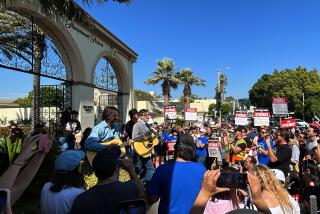Congress Members Urge Investigation of Radio Payola
- Share via
Several members of Congress on Thursday called for the federal government to investigate whether Clear Channel Communications Inc. and other radio broadcast giants are violating payola laws.
Their comments follow a report in The Times disclosing that a coalition of record companies and artist unions were preparing to call for the Federal Communications Commission to probe questionable promotion practices in the music industry, in which middlemen pay radio stations for the exclusive right to pitch songs on behalf of record labels.
“What’s happening here is a process that the record labels once thought helped facilitate getting radio airplay has now become so coercive and expensive ... that they’ve finally decided to ... come forward publicly to expose a practice they participated in for a long time,” said Rep. Howard L. Berman (D-Mission Hills).
There has been a federal payola statute for 40 years that prohibits radio stations from accepting money for playing songs without disclosing that information to listeners. The payola laws were enacted after a scandal that exposed rock deejays taking money from record labels to play certain songs.
Seeking to distance themselves from airplay transactions, record labels soon began hiring independent promoters to pitch their songs to radio. But for years, record executives have privately acknowledged the soaring cost of paying promoters in order to sidestep the payola law. These promotions now cost the record labels an estimated $150 million a year, sources said.
Since 1996, the radio industry has rapidly consolidated through a series of mergers. Clear Channel now controls about 1,225 radio stations, and its rival Infinity, owned by Viacom Inc., controls about 200 stations.
The Recording Industry Assn. of America and other music groups claim that the cost of getting a song played on the air continues to rise.
“The issues in this complaint raise critical 1st Amendment and communications law issues,” said Rep. John Conyers Jr. (D-Mich.). “[We need] a full and complete airing of the matter so we can begin to resolve these allegations and protect the best interests of both creators and the listening public.”
Sen. Russell D. Feingold (D-Wis.) said Thursday that he plans to introduce legislation to strengthen payola laws and other problems accelerated by deregulation in the broadcast industry.
“We need to close the loopholes in the existing laws,” said Feingold, who also wants to set a cap on radio station ownership.
Meanwhile, executives at Clear Channel denied any wrongdoing and said the record labels were using the broadcast giant as a scapegoat for their own problems.
“Clearly, the [record] labels are in trouble these days, but it’s not our fault,” said Randy Michaels, chief executive of the radio division of Clear Channel. “We didn’t create the independent promotion system. They did. We’re just dealing with the animal that exists.
“For us to be cast as the bad guy here is ridiculous,” Michaels added. “The fact is we’ve done more than anyone else in this business to try to clean up what everyone knows was an ugly and corrupt system.”
The current promotion system followed another payola scandal in the late 1980s. Since then, independent promoters have hired former FCC attorneys to help them sidestep the law by paying broadcasters annual promotional fees they say are not tied to airplay of specific songs.
Radio stations are required to sign a contract each year for this “promotional” fee, which says they are not obligated to play any record the independent promoter pitches. All the station must do is tell the promoter in advance which songs it will add to its playlist each week. The promoter then turns around and collects as much as $4,000 per song from the record labels that hire him, according to promoters and labels.
For more than a decade, this arrangement has allowed promoters to exert influence over airplay while keeping record firms at an arms-length from such transactions. On paper, the arrangement satisfied the FCC, and in practice, record companies got new songs on the air, various promoters said.
When Clear Channel and other radio groups began buying up more stations, the broadcast giants wanted to tap into more of these promotional funds. So they designated specific independent promoters to be their exclusive representatives for a group of stations with record labels. But not only did promotional prices rise, record executives privately said, the independent promoters began to adhere closer to the law and had less influence over airplay.
“Blaming the radio industry for independent music promotion is blatantly absurd,” said Kraig Kitchin, president of Premier Radio Networks, a division of Clear Channel Radio. “The day [the labels] choose to discontinue to pay the independent music promotion companies is the day it stops.”
More to Read
The biggest entertainment stories
Get our big stories about Hollywood, film, television, music, arts, culture and more right in your inbox as soon as they publish.
You may occasionally receive promotional content from the Los Angeles Times.










